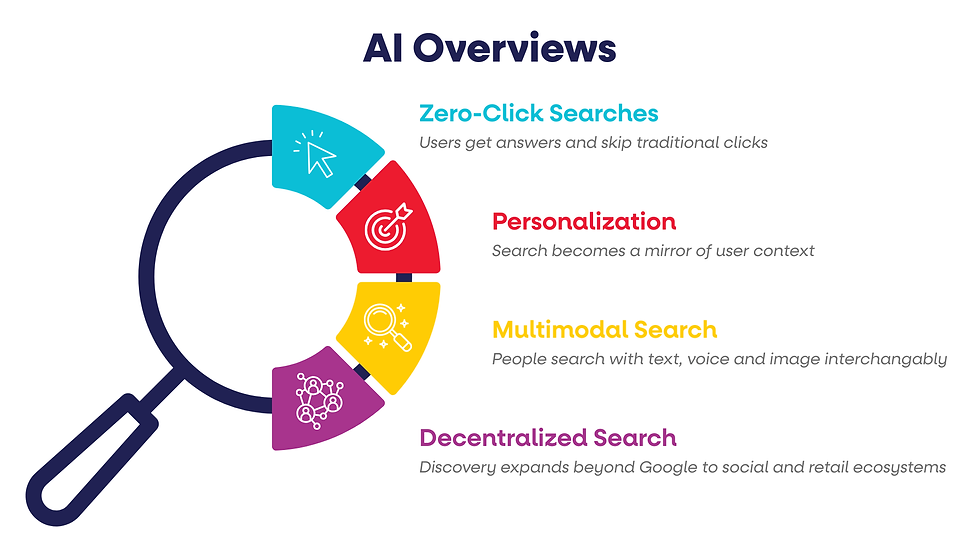SEO in 2026: What Every Business Should Expect
- Greg Augustine

- Nov 18, 2025
- 2 min read

The Future of Search is Already Here
SEO in 2026 can be summarized in one phrase: intelligent visibility. Search has shifted from being reactive to predictive, adaptive and deeply personalized. Algorithms don’t just index content anymore, either. They interpret it and analyze tone, emotional nuance and context to deliver experiences that feel conversational rather than transactional.

From mobile-first indexing to AI-generated summaries, every innovation in search has moved us closer to one goal: understanding intent as well as language.
Whether a user speaks to a voice assistant, snaps a photo for visual search or types a long-tail query, AI understands the underlying intent. This shift makes it essential for businesses to build online ecosystems that communicate clearly with both people and machines, and those that thrive will balance authenticity with technical fluency.
Flint’s POV: We’ve seen that “intelligent visibility” isn’t just about ranking – it’s about resonance. When a brand’s content genuinely aligns with what users care about, algorithms notice. SEO success increasingly mirrors human relevance.
Key SEO Trends Defining 2026

AI overviews are the catalyst driving every major search trend and are turning discovery into dialogue.
Each trend interlocks with the next, forming a connected chain of influence:
AI overviews reshape discovery: Google’s AI Overviews reach over a billion users, so earning citations in these summaries now matters as much as traditional page-one rankings (Google Blog).
Zero-click searches dominate: Nearly 2/3 of queries end without a click, and success now requires measuring visibility and not just counting traffic (Bain and Company).
Personalization becomes the norm: Search results adapt based on context, browsing history and location (Google Blog).
Multimodal search expands: Voice, image and video inputs are merging into unified experiences (PwC).
Search decentralizes: Platforms like TikTok, YouTube and Amazon increasingly act as independent search ecosystems for news, product reviews and community recommendations (Pew Research Center).
How Businesses Should Respond
Engineer for AI understanding: Implement structured data and schema that clarify context.
Showcase real expertise: Apply E-E-A-T principles to ensure you’re posting relevant content and feature lived experience whenever possible.
Expand across platforms: Invest in social media, include voice search considerations and optimize for commerce-based search engines.
Measure differently: Use metrics like impression share and entity mentions.
Upskill internally: Build team literacy in AI-first practices across all skill areas.

Most future-ready teams are already investing in the three pillars of SEO resilience: structure, authority and adaptability.
Flint’s POV: The most sustainable SEO strategies we’ve implemented don’t chase algorithms – they anticipate behavior. Training teams to think like both creators and data interpreters builds long-term resilience.
The Broader Connection
Check out the other posts in this series to learn more about the changing landscape of search engine optimization in the age of artificial intelligence:
Flint helps brands translate the complexity of modern search into clarity, confidence and measurable visibility.


